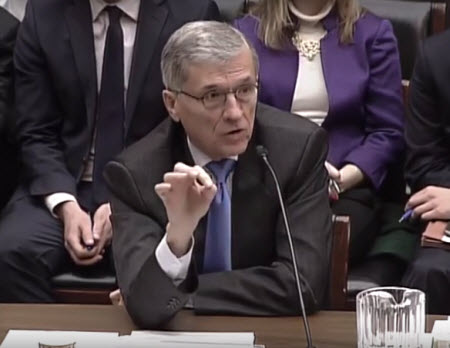Wheeler Proposing Set-Top Standards Enforcer
The smarter way to stay on top of the multichannel video marketplace. Sign up below.
You are now subscribed
Your newsletter sign-up was successful

FCC chairman Tom Wheeler is putting the final touches on a set-top box proposal that would create a central licensing agency to oversee standards for an apps-based approach to third-party access to video content.
Cable operators are not pleased, saying they are committed to licensing an app on reasonable terms, but that the FCC plan would create a new compulsory license.
The standards body would have to years to come up with a standard license and would enforce it, though the FCC would review its work and put it out for comment, according to an ex parte filing by the National Cable & Telecommunications Association and sources talking with FCC staffers.
The FCC would set the baseline terms of the license and be able to eliminate terms that did not promote device competition.
Read more about the FCC's efforts to create new set-top rules.
Device makers over a certain size would be eligible for the license and could negotiate additional terms with MVPDs, who would have to develop an app for the device. If an MVPD felt the terms were not doable, it could seek a waiver from providing an app for that platform.
The license would apply to both HTML5 and non-HTML apps.
The smarter way to stay on top of the multichannel video marketplace. Sign up below.
Wheeler is trying to promote a competitive set-top marketplace, so MVPD apps would have to offer parity with the consumer set-top experience to the degree technically feasible. That would include things like channel lineups and recording, which MVPDs could handle via cloud DVR capability.
Cable operators with fewer than 400,000 subs would be exempt, while those with more than 400,000 and less than 1 million would get a phase-in.
MVPDs would have to let third-party devices access consumer data and would have to build in an opt-in choice in the apps for sharing personal information.
NCTA pitched an apps-based approach and wants channel lineups protected, but the centralized standards body enforcing the licenses did not sit well with the trade group.
In a meeting with FCC staffers, NCTA execs said the proposed licensing body approach is "unnecessary and unworkable; exceeds the Commission’s authority under Section 629; essentially imposes a royalty-free compulsory copyright license on MVPDs and programmers, which would also be well beyond the Commission’s authority to adopt; and raises other legal issues."
The NCTA said MVPDs are commited to offer a standard license on reasonable terms, so a standards licensing body is unnecessary.
Wheeler is expected to bring up the proposal for a vote at the FCC's September meeting. The agency will circulate on Sept 8 its tentative agenda for the meeting.
Contributing editor John Eggerton has been an editor and/or writer on media regulation, legislation and policy for over four decades, including covering the FCC, FTC, Congress, the major media trade associations, and the federal courts. In addition to Multichannel News and Broadcasting + Cable, his work has appeared in Radio World, TV Technology, TV Fax, This Week in Consumer Electronics, Variety and the Encyclopedia Britannica.

